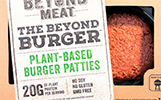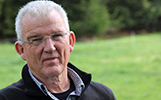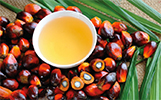| Montana Ranchers Need Your Help
Burt Rutherford, Beef Magazine | July 31, 2017
Wildfires are raging in parts of Montana, devouring ranches and consuming cattle. Here's how you can help.
"The only reason our horses are alive, our barn is still standing, our house is still there, is because of our neighbors. There were 14– and 16–year–old kids on the back of trucks holding hoses spraying water. Nobody has slept in days. The people that are here are the ranchers, and they have not stopped working; they have not gotten out of their graders. They are trying desperately to save these ranches." She said the best help is monetary donations in order to help these ranchers begin to rebuild once this is over.
Click here for more and for a list of places that are accepting donations.
Interestingly, while vegetable based burgers claim they are healthier, the composition described below does not seem so:
The Role of Plant-Based, Meatless Meats in Sustainable Diets 
FCRN Blogs: hswartz5
Both the Beyond and Impossible Burger burgers contain 20 grams of plant protein per serving, relatively equivalent to one beef patty. Compared to normal burgers, these have significantly more calories and about six times as much Sodium. The difference in fats is also striking – the Impossible Burger has 15 grams of saturated fat (triple that of a beef burger) – and may contribute to any taste differential noticed by a serious meat eater.
Both "meatless meat" options are more expensive than beef burgers. In grocery stores, the Beyond Burger sells for $5.99 for two quarter–pound patties. Compare this to a full pound of beef patties for $3 to $5. The Impossible Burger sells for $12 to $14 based on city location and additions (e.g. cheese).
Good Financial Reasons to Produce Beef from Dairy Herds 
Stuff.co.nz | August 2, 2017
"Two recent industry initiatives demonstrate the value proposition for better beef genetics – the first funded by Beef + Lamb NZ which was called the Dairy–Beef Integration Project and conducted by AgResearch over five years. The second, Beef + Lamb Genetics' dairy–beef progeny test, which is currently running on Limestone Downs.
"Both projects confirm unselected beef bulls are risky to use – they have higher levels of calving difficulty, longer gestation length and lower post–birth calf growth rate. They were often not fit for purpose."
However, the best of the beef bulls from each project demonstrated that if farmers took the time to find beef genetics that were fit for purpose it was worth the effort, First farm consultant Bob Thomson said.
PepsiCo Now Traces 90% of Palm Oil Back to the Mill to Ensure Future Supply 
Jennifer Hermes, Environmental Leader | August 2 2017
Eight major corporations including McDonald's and L'Oreal recently joined the newly–expanded supply chain platform of CDP – the non–profit that drives companies and governments to reduce their greenhouse gas emissions, safeguard water resources and protect forests – to request information from their key suppliers on how they are managing the risks linked to deforestation. The companies say they are combining their purchasing power to achieve deforestation–free commodity supply chains.
China Bans Australian Beef Imports from Six Packing Plants
Wyatt Bechtel, Drovers | July 31, 2017
Six packing plants in Australia have been temporarily banned from exporting beef to China. On July 26, Australian trade officials confirmed that Chinese authorities had halted beef trade with six plants for labeling inaccuracies.
Chinese newspaper Global Times reports that 12 import shipments from the six packing plants were denied entry into the country because they were in violation of regulations stipulated in the China–Australia Free Trade Agreement.
Beef that was shipped to China prior to July 24 is still able to enter the food chain, after that there is a 45 day investigation period ongoing.
Animal Welfare vs. Animal Rights: What's the Difference, Really?
Gregory Bloom, Meatingplace | August 3, 2017
Animal welfare is concerned with the best practices for ensuring proper treatment of domesticated animals, both animals raised for food and those kept as pets. As my July 6th blog stated, "They should be given a reasonably comfortable life. They should be treated with care and never abused."
Animal rights means an entirely different thing. Here's the definition from PETA's own website: "Animal rights means that animals deserve certain kinds of consideration–consideration of what is in their best interests, regardless of whether they are cute, useful to humans, or an endangered species, and regardless of whether any human cares about them at all. It means recognizing that animals are not ours to use–for food, clothing, entertainment, or experimentation."
This next piece is not necessarily recommended reading; I have to laugh every time I read about Tracy Hunt and his "research" – he has never once talked to anyone from GRSB, despite my reaching out to him.
Tomi Lahren, J. Dudley Butler Among R–CALF Convention Speakers
Tri–State Livestock News | July 31, 2017
"National cattle trade association R–CALF USA is making final preparations for its upcoming 18th Annual Convention to be held August 25–26 at the Best Western Ramkota Hotel in Rapid City, South Dakota. Keynoting the convention will be Rapid City native and now conservative political commentator Tomi Lahren, who has supported the interests of America's independent ranchers on her vast social media platform with 4.4 million followers.
Tracy Hunt, Wyoming attorney and rancher, will present his research on the Global Roundtable for Sustainable Beef and explain why and how this movement intends to assist multinational corporations capture the live cattle supply chain away from independent cattle producers. | |
